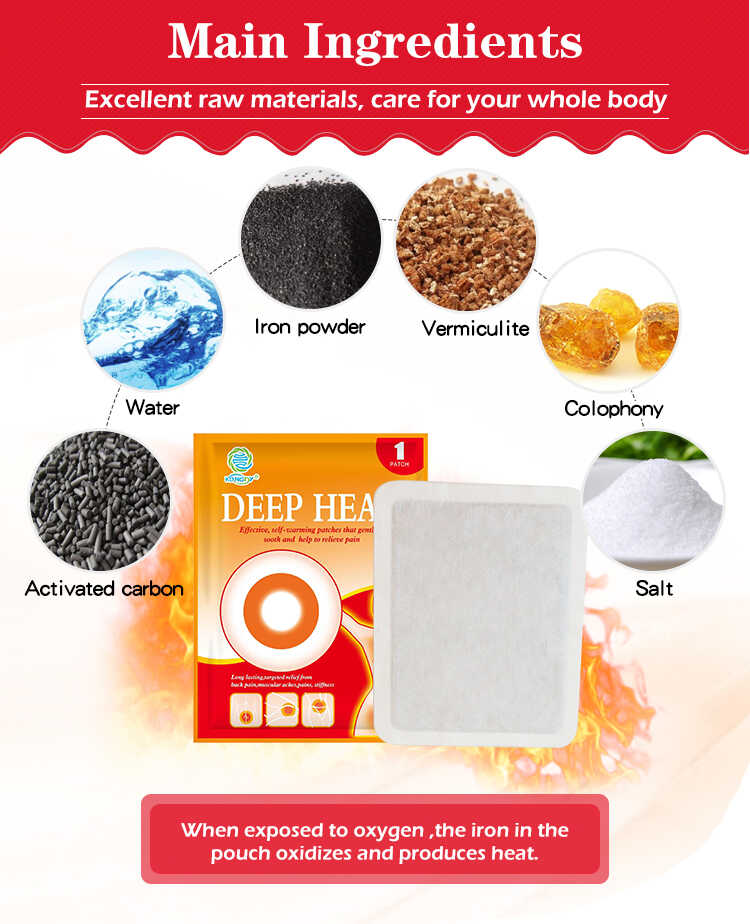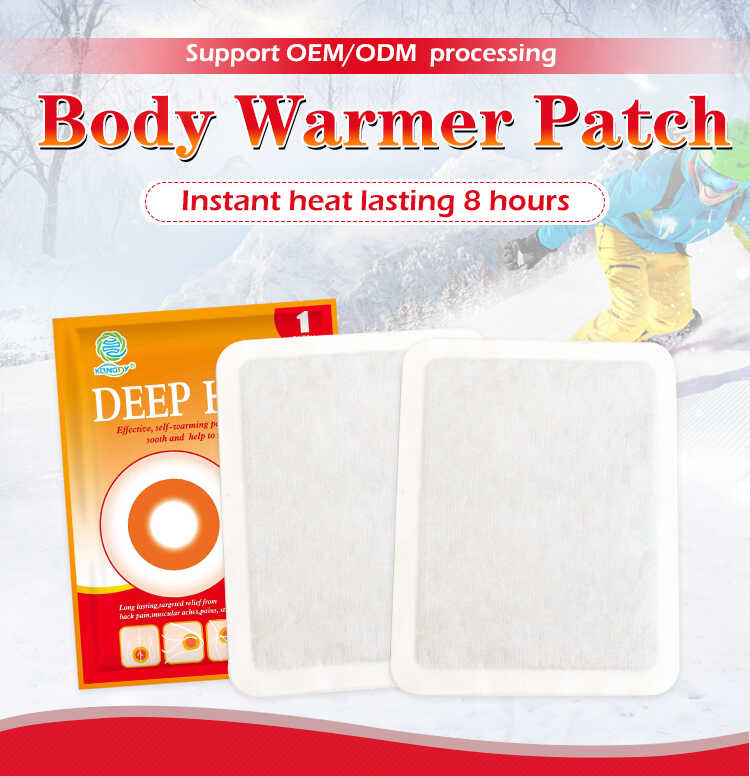Do Custom Menstrual Pain Relief Patches Require Additional Quality Testing?
In the competitive world of feminine health and wellness, Custom Menstrual Pain Relief Patches are gaining immense popularity for their targeted effectiveness, natural ingredients, and user-friendly designs. However, with customization comes added responsibility—particularly in terms of safety, consistency, and compliance.
While standard menstrual patches already undergo strict quality checks, customized formulations often introduce new materials, active ingredients, or designs that require additional quality testing to ensure safety and performance. Whether you’re working with a Menstrual Pain Relief Patches Manufacturer, developing through a Menstrual Pain Relief Patches OEM, or launching a Private Label Menstrual Pain Relief Patches line, understanding the scope of additional testing is critical to maintaining your brand’s credibility and consumer trust.

1. Why Quality Testing Is Essential for Menstrual Pain Relief Patches
A trusted Menstrual Pain Relief Patches Supplier must ensure that every product performs safely and effectively under real-world conditions. Menstrual patches are applied directly to the skin for hours, so even minor formulation or material changes can significantly affect safety, comfort, and efficacy.
Quality testing serves several key purposes:
Ensures skin compatibility and prevents irritation
Validates pain-relieving efficacy of active ingredients
Confirms consistency across production batches
Ensures regulatory compliance in target markets
Protects brand reputation by minimizing recall risks
For Custom Menstrual Pain Relief Patches, quality testing becomes even more critical because customized formulas often involve new herbal extracts, unique adhesive systems, or innovative patch technologies—each of which introduces new safety variables that must be tested and verified.
2. What Makes Custom Menstrual Pain Relief Patches Different?
Unlike mass-produced products, Custom Menstrual Pain Relief Patches are designed to meet specific brand or consumer needs. Customization may include:
Unique combinations of herbal ingredients (e.g., mugwort, ginger, lavender, or capsaicin)
Enhanced heat therapy or cooling effects
Modified adhesive strength or patch materials
Customized size, shape, or duration of use
Distinctive private label packaging and branding
Each modification can impact the patch’s chemical composition, physical performance, or user experience. As a result, a professional Menstrual Pain Relief Patches OEM must conduct additional quality testing to ensure that every customized element remains safe and effective.
3. Key Areas Where Custom Menstrual Pain Relief Patches Require Additional Testing
3.1 Ingredient Compatibility and Safety Testing
When new ingredients are introduced into a customized formula, the Menstrual Pain Relief Patches Manufacturer must test for potential chemical interactions, skin irritation, and allergenicity.
Additional testing includes:
Toxicology assessment of all active and inactive ingredients
Dermal irritation and sensitization tests on human or synthetic skin models
Stability testing to confirm ingredient safety over the product’s lifespan
For example, if a Custom Menstrual Pain Relief Patch combines menthol with herbal oils, compatibility testing ensures that the blend remains safe and stable without producing unwanted reactions.
3.2 Adhesive and Material Testing
Customized patches often use unique adhesives or backing materials to improve comfort or wear time. However, not all adhesives are suitable for prolonged skin contact—especially on sensitive areas.
Additional testing by the Menstrual Pain Relief Patches Supplier includes:
Adhesion strength tests to measure stickiness and peel-off performance
Skin irritation and contact dermatitis testing
Temperature stability testing to verify performance under heat therapy conditions
If the patch uses bio-based or medical-grade adhesives, biocompatibility testing ensures that these materials meet ISO 10993 standards for skin-contact products.
3.3 Stability and Shelf-Life Studies
Customized formulations can affect the patch’s chemical and physical stability. A Menstrual Pain Relief Patches OEM performs extended stability studies under varying environmental conditions to ensure:
Ingredient potency remains stable over time
No microbial growth occurs during storage
Packaging integrity protects against humidity or contamination
For Private Label Menstrual Pain Relief Patches, these tests are vital for setting accurate expiration dates and storage recommendations—both of which are required for regulatory submissions and consumer safety.
3.4 Efficacy Verification
While standard patches may rely on proven formulas, Custom Menstrual Pain Relief Patches often include innovative ingredients or unique delivery systems. Therefore, the Menstrual Pain Relief Patches Manufacturer must conduct efficacy tests to confirm that the new formula still delivers reliable pain relief.
These tests may include:
Clinical trials with volunteer participants
Comparative performance studies against benchmark products
Transdermal absorption testing to measure how effectively active ingredients penetrate the skin
Such testing ensures the customized product not only feels effective but performs as well—or better—than standard patches.
3.5 Microbiological and Contamination Testing
Any change in formulation or production process increases the risk of microbial contamination. A certified Menstrual Pain Relief Patches Supplier conducts microbiological testing on all custom formulations to detect:
Bacteria, yeast, and mold
Pathogens like Staphylococcus aureus or Pseudomonas aeruginosa
Microbial growth under accelerated storage conditions
Custom patches containing herbal ingredients or essential oils require even stricter testing, as natural compounds can serve as microbial nutrients if not properly preserved.
3.6 Heavy Metal and Residue Analysis
For custom patches with botanical or mineral ingredients, heavy metal and pesticide residue tests are crucial. These ensure the product meets global safety standards (such as FDA or EU regulations).
The Menstrual Pain Relief Patches Manufacturer performs laboratory analysis for:
Heavy metals: lead, arsenic, mercury, cadmium
Pesticide residues (for plant-based ingredients)
Residual solvents or volatile organic compounds (VOCs)
Such data is necessary to support product registration and to protect users from potential toxicity.
3.7 Packaging Compatibility Testing
Customized patches often come with unique packaging designs, such as eco-friendly pouches, resealable foil bags, or branded boxes.
However, packaging materials can interact with patch ingredients, affecting safety or performance. Therefore, the Menstrual Pain Relief Patches OEM performs packaging compatibility tests to ensure:
No leaching or chemical migration from packaging
Protection from moisture and oxygen exposure
Maintenance of adhesive performance and freshness
These tests verify that the product remains stable and effective throughout its shelf life.
3.8 Biocompatibility Testing
Because Custom Menstrual Pain Relief Patches are in prolonged contact with skin, biocompatibility testing under ISO 10993 standards is often required.
This involves:
Cytotoxicity tests (cell safety)
Sensitization tests (allergy risk)
Irritation tests (skin response)
Such testing is especially critical when new materials or adhesives are used, ensuring the product is safe for all skin types, including sensitive users.
4. How Certified OEM Manufacturers Handle Additional Testing
Leading Menstrual Pain Relief Patches Manufacturers follow structured and transparent testing procedures based on international quality frameworks like ISO 13485, GMP, and CE marking.
A professional Menstrual Pain Relief Patches OEM typically handles additional testing through the following steps:
Pre-formulation Assessment: Review all new materials and ingredients for regulatory and toxicological compliance.
Prototype Evaluation: Produce small pilot batches for internal safety testing.
Third-Party Laboratory Testing: Submit samples to accredited labs for independent validation.
Clinical and Dermatological Trials: Conduct studies on human subjects under medical supervision.
Quality Documentation: Compile safety reports, stability data, and test certificates for certification and export.
Working with a certified Menstrual Pain Relief Patches Supplier ensures that all additional tests are properly documented and that your custom product meets every applicable standard for international distribution.
5. The Regulatory Perspective: When Is Extra Testing Required?
Regulatory authorities worldwide classify menstrual pain relief patches differently depending on their composition and function.
For example:
In the United States, patches containing active pain-relieving ingredients (like menthol or lidocaine) are regulated as OTC drugs under the FDA.
In the European Union, such patches may fall under medical device regulations (MDR) requiring CE marking.
In Asia-Pacific regions, herbal-based patches may be regulated as cosmetic or traditional remedies—but still require safety testing for skin compatibility.
Whenever a Custom Menstrual Pain Relief Patch introduces new active ingredients, materials, or therapeutic claims, additional testing becomes mandatory for regulatory approval and import clearance.
6. The Benefits of Additional Quality Testing for Custom Products
While extra testing may seem time-consuming or costly, it brings several long-term benefits for brands and consumers alike:
Consumer trust and brand reputation: Scientifically tested products build confidence and loyalty.
Regulatory compliance: Ensures smooth approval and importation across global markets.
Product differentiation: Validated claims like “clinically tested” or “dermatologist-approved” enhance marketing impact.
Reduced risk: Prevents costly recalls and consumer complaints.
Sustainability and innovation: Testing supports new eco-friendly or herbal-based formulations safely.
A reputable Menstrual Pain Relief Patches Manufacturer understands that every investment in quality testing strengthens brand value and market competitiveness.
7. How to Choose a Quality-Focused Custom Patches OEM
When selecting a Menstrual Pain Relief Patches OEM, consider the following indicators of testing excellence:
Certifications: ISO 13485, GMP, CE, and FDA registration.
Testing infrastructure: In-house labs or partnerships with certified third-party testing agencies.
Experience: Proven success in developing Custom Menstrual Pain Relief Patches for international clients.
Transparency: Ability to provide detailed test reports and safety dossiers.
Flexibility: Support for clinical testing and documentation for specific export markets.
A professional Menstrual Pain Relief Patches Supplier not only manufactures your product but also acts as a compliance partner—ensuring that every custom formulation passes global safety and quality standards.
Conclusion
Yes—Custom Menstrual Pain Relief Patches do require additional quality testing. Whenever you modify ingredients, materials, or formulations, new variables are introduced that must be scientifically verified for safety, stability, and effectiveness.
A certified Menstrual Pain Relief Patches Manufacturer or OEM will conduct extensive testing, including ingredient compatibility, stability, biocompatibility, microbiological, and efficacy studies. These tests not only ensure compliance but also protect your brand’s reputation and end-user safety.
By partnering with a quality-driven Menstrual Pain Relief Patches Supplier, brands can confidently launch Private Label Menstrual Pain Relief Patches that meet the highest global standards—offering consumers safe, effective, and trustworthy menstrual comfort solutions.
Related Questions and Answers
Q1: Why do Custom Menstrual Pain Relief Patches need extra testing?
A1: Because new ingredients, adhesives, or designs can introduce new safety variables that must be verified through additional testing.
Q2: What types of tests are added for customized formulations?
A2: Ingredient compatibility, biocompatibility, stability, microbial, and efficacy tests are typically required.
Q3: Do Private Label Menstrual Pain Relief Patches need the same tests?
A3: Yes, especially if the private label version modifies the formula, materials, or packaging of the original product.
Q4: How does a Menstrual Pain Relief Patches Manufacturer ensure safety during customization?
A4: By conducting internal quality checks and independent third-party testing following ISO and GMP standards.
Q5: What certifications indicate high-quality custom patch production?
A5: ISO 13485, GMP, FDA registration, CE marking, and ISO 22716 (for cosmetic-grade patches).
Q6: How long does additional quality testing take?
A6: Depending on complexity, full testing—including stability and clinical trials—may take 2–6 months.






